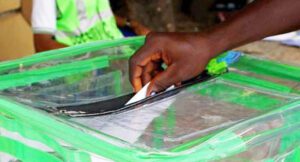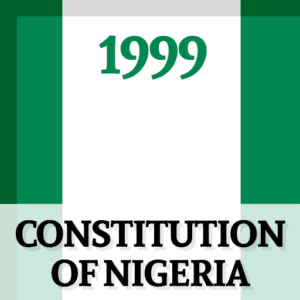Constitutional review: Awakening to emerging realities in the configuration of the Nigerian Federation
Constitutional matters have been a pressing subject of discourse in Nigeria over time. Most recently, questions revolving around the feasibility of the subsisting 1999 Constitution of the Federal Republic of Nigeria in catering for pressing demands of recent realities have been a centre of focus. The questioning of the status quo has not far fetched erupted from the worsening of socio-economic conditions with political disturbances in the Country, most recently. The resonance of such disturbances as clamour for secession, self determination, restructuring of the federation, state police, and fiscal federalism among others, are dissenting matters finding expression from results of the dimensions of debilitation of the political framework of the Federation.
While there have been echoes on the necessity to institute constructive amendments of the Constitution to redefine the orientation of the political architecture of the Federation to reflect new realities, it is more or less observable that the disposition, on the part of the custodians of political power to the demands, appear to be too cold for the heat of the troubles the present perceivable rot in the system is bearing on the fabrics of the Country. Argument against the disposition has been centred on the ground that since the subsisting formations appeal to the interest of the recycling cabals of leaders who have held grip to power, the calls to effect such reconfiguration have remained uninteresting to them. Hence, while clamours continue to grow for demands over constitutional amendments and institutional reformation, the custodians of power architecture of the subsisting system have strategically maintained cunning seat of diplomatically frustrating, or better still, deploying instruments to reduce the reality of such moves to a crawling fate subjected to strangulating climate, difficult for it to survive.
It has been observed that the subsisting system to the degree of rational thought, apparently bend towards the interest of a few who have dominated the power architecture with firm grip. Questions over the possibilities of development and bright fortune taking place in the Country under the watch of the recycling cabal of leaders who have held grip to power, have remained paradoxical. The argument has been anchored on the prospect of development in the Country, if the same set of leaders who have failed to propel growth over the years in the Country, have any possibility of performing magic in any nearest future. On this ground, the call and recommendation for a reformation of the system to give reflections of new structures which would create ample chance for fresh blood to come into the system has been reverberating.
Giving perspective to the argument, renowned lawyer and founder of the Afe Babalola University, Ado-Ekiti, ABUAD, Aare Afe Babalola (SAN), on Monday, July 2021, at the 5th Ife Institute of Advanced Studies, Summer Institute Programme, taking place at the Obafemi Awolowo University, Ile-Ife, in Osun State, had warned that unless there is a new constitution before the 2023 general election, Nigeria will continue to recycle failed leaders. While speaking as the special guest of honour, the Senior Advocate who insisted that the 1999 Constitution remains the biggest problem of the Nigeria, argued that until it is replaced, the Country would not be able to make any meaningful progress.
He was quoted: “Those who wish this country to remain an indivisible entity, and I am one, must unite to ensure that we replace the present 1999 Constitution with a truly Federal Constitution and a Parliamentary system of government, which is more involving and less expensive.
“It is my considered view that a new constitution must be in place before the next election, otherwise we will be recycling the same failed leaders that have brought Nigeria to where it is today.
“The proposed constitution will spell out the number of political parties and percentage of women representation, among others. It will also enable knowledgeable, selfless, patriotic and non-tribalistic Nigerians to emerge as leaders and make governance less expensive. In addition, it will discourage politics from being the most lucrative business in Nigeria.
“The constitution must prevent transactional businessmen from contesting elections. The constitution must make provision for Independent Candidates to contest and win elections.”
Postulating ways to avoid money politicking, particularly in election in the Country, the legal luminary who posited that the new constitution must provide that the National Assembly shall consist of 60 per cent of Nigerians elected by Professional Bodies including the Nigerian Bar Association, Nigerian Medical Association, Nigerian Stock Exchange, Civil Society Organisations, Nigerian Labour Congress, Academic Staff Union of Universities, Trade Union Congress and National Association of Nigerian Students, each of which will be allocated a particular percentage out of the 60 per cent to be elected into the Legislative Houses.
“The remaining 40 per cent shall be contested by all qualified voters. This way, we will have a Parliament consisting of 60 per cent of elected members by professionals and opinion leaders whose election will not be affected with votes bought with as little as N5,000. Nigeria does not need two Houses in the National Assembly. All we need is one House with the number of Legislators reduced to 50 per cent of what it is today,” he argued.
The need for the cycle of leaders in the Country to redirect the orientation of the political architecture of the Federation is paramount in the best interest of national preservation. The prevailing orientation which has saturated the configuration of the system with discolouration of inconstructive political culture which has reduced the Country to the myriad of political heat, overturning prospects of goodwill for the Country, is highly detrimental and undesirable. The orientation which has informed the sensational disposition to power and governance in the Country has apparently failed and, by sincere assessment, recalcitrant to development in all facets. The resisting character has been strongly debilitating to the fabrics of the social, political, and political configurations of the Country.
The position of the Nigerian Federation is threatened by the myriad of disturbances brewing strings which have heated the polity in recent times. It is apparent that the hostile disposition of the custodians of the political climate to modify the subsisting configuration of the political architecture of the Federation, has been giving ample chance to voices of antagonistic tendencies against the polity. The effects of the perceivable rot in the subsisting character of the institutional configuration of the Federation, which by and large appears to have fallen short of relevance to attend to, cater for and address the emerging needs of the Federation, have borne beyond political impacts but debilitating forces to the entire fabrics of societal formations of the Country.
The necessity for the custodians of the political space to lay foundation for the preservation and sustainability of the Federation in the long run is paramount. In this light, taking turn to nurturing the positive mindset and political will required in building up sensations towards driving the philosophical rationality to institute a paradigm shift in the best interest of the Federation becomes significant. Given that realities have shown that the prevailing system has fallen short to address emerging demands, the need for a paradigm shift in orientation to governance and its reflection taking effect in the formation of the structural configuration of the Federation through modification of antiquated architectures informed by the constitution, has become pressing. The custodians of the political architectures need to wake up to this reality.




